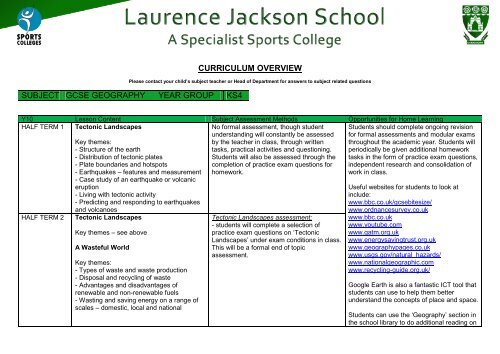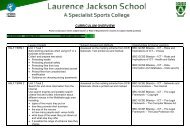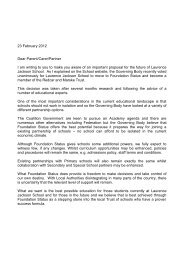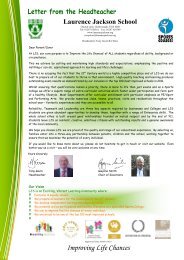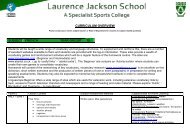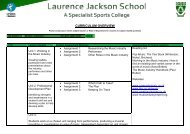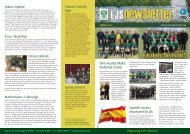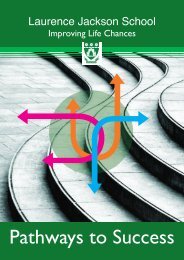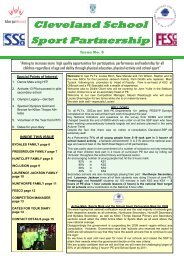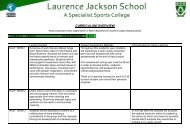Year 11 Geography - Laurence Jackson School
Year 11 Geography - Laurence Jackson School
Year 11 Geography - Laurence Jackson School
Create successful ePaper yourself
Turn your PDF publications into a flip-book with our unique Google optimized e-Paper software.
CURRICULUM OVERVIEWPlease contact your child’s subject teacher or Head of Department for answers to subject related questionsSUBJECT GCSE GEOGRAPHY YEAR GROUP KS4Y10 Lesson Content Subject Assessment Methods Opportunities for Home LearningHALF TERM 1 Tectonic LandscapesNo formal assessment, though studentunderstanding will constantly be assessedby the teacher in class, through writtentasks, practical activities and questioning.Students will also be assessed through thecompletion of practice exam questions forhomework.HALF TERM 2Key themes:- Structure of the earth- Distribution of tectonic plates- Plate boundaries and hotspots- Earthquakes – features and measurement- Case study of an earthquake or volcaniceruption- Living with tectonic activity- Predicting and responding to earthquakesand volcanoesTectonic LandscapesKey themes – see aboveA Wasteful WorldKey themes:- Types of waste and waste production- Disposal and recycling of waste- Advantages and disadvantages ofrenewable and non-renewable fuels- Wasting and saving energy on a range ofscales – domestic, local and nationalTectonic Landscapes assessment:- students will complete a selection ofpractice exam questions on ‘TectonicLandscapes’ under exam conditions in class.This will be a formal end of topicassessment.Students should complete ongoing revisionfor formal assessments and modular examsthroughout the academic year. Students willperiodically be given additional homeworktasks in the form of practice exam questions,independent research and consolidation ofwork in class.Useful websites for students to look atinclude:www.bbc.co.uk/gcsebitesize/www.ordnancesurvey.co.ukwww.bbc.co.ukwww.youtube.comwww.gatm.org.ukwww.energysavingtrust.org.ukwww.geographypages.co.ukwww.usgs.gov/natural_hazards/www.nationalgeographic.comwww.recycling-guide.org.uk/Google Earth is also a fantastic ICT tool thatstudents can use to help them betterunderstand the concepts of place and space.Students can use the ‘<strong>Geography</strong>’ section inthe school library to do additional reading on
HALF TERM 3HALF TERM 4HALF TERM 5A Wasteful WorldKey themes – see aboveRevision for Mock ExamControlled AssessmentControlled AssessmentHALF TERM 6 Revision for Modular Examination (25%of final GCSE)Controlled AssessmentA Wasteful World assessment:- students will complete a selection ofpractice exam questions on ‘A WastefulWorld’ under exam conditions in class. Thiswill be a formal end of topic assessment.<strong>Year</strong> 10 Mock Exam:- students will complete a full practice GCSE<strong>Geography</strong> exam paper in preparation forthe forthcoming June modular examinationControlled Assessment:- students will continue writing up theircontrolled assessment, which accounts for25% of the final GCSE <strong>Geography</strong> grade- students should aim to achieve at least onegrade above their target for this piece ofwork5GA2 Modular Examination:- students complete their first modularexamination in the June of <strong>Year</strong> 10. Theexam lasts for 1 hour and students will beexamined on ‘Tectonic Landscapes’ and ‘AWasteful World’each topic. There are numerous copies of‘National Geographic’ at the back of G2,which students should be encouraged toborrow.Interesting and relevant information canoften be found by watching TVdocumentaries. The BBC and Channel 4have previously shown some fascinatingprogrammes, such as Human Planet,Megacities and Planet Earth. Programmessuch as Horizon and Panorama are alsogood to watch out for.Watching the news and reading newspaperswill help students keep up to date withcurrent geographical issues. Doing this willalso help students to develop their casestudy material.- this examination accounts for 25% of thefinal GCSE <strong>Geography</strong> grade. It isimperative that students undertakecomprehensive revision at home to ensurethey are prepared for thisY<strong>11</strong> Lesson Content Subject Assessment Methods Opportunities for Home LearningHALF TERM 1Controlled AssessmentPopulation ChangeKey themes:- Global population growth- Population distribution and densityControlled Assessment:- students will finish writing up theircontrolled assessment, which accounts for25% of the final GCSE <strong>Geography</strong> gradeStudents should complete ongoing revisionfor formal assessments and modular examsthroughout the academic year. Students willperiodically be given additional homeworktasks in the form of practice exam questions,independent research and consolidation ofwork in class.
HALF TERM 2HALF TERM 3- Demographic Transition Model- Factors affecting population distribution inChina and the UK- Coping with a large population – the ChinaOne Child Policy- Coping with a small population – theSingapore ‘Three of More’ Policy- Population pyramids- Youthful and ageing populationsPopulation ChangeKey themes – see aboveA Tourist’s WorldKey themes:- Causes of the growth in tourism- Human and physical attractions of holidaydestinations- Types of holiday- Butler Model of Resort Development- Effects of tourism growth- Eco-tourismA Tourist’s WorldKey themes – see aboveRevision for Modular Examination (25%of final GCSE)Challenges for the PlanetKey themes:- Long-term and current climate change- Effects of climate changeA Wasteful World assessment:- students will complete a selection ofpractice exam questions on ‘PopulationChange’ under exam conditions in class.This will be a formal end of topicassessment.<strong>Year</strong> <strong>11</strong> Mock Exam:- students will complete a practice GCSE<strong>Geography</strong> exam paper in preparation forthe forthcoming January modularexamination5GA3 Modular Examination:- students complete their second modularexamination in the January of <strong>Year</strong> <strong>11</strong>. Theexam lasts for 1 hour and students will beexamined on ‘Population Change’ and ‘ATourist’s World’- this examination accounts for 25% of thefinal GCSE <strong>Geography</strong> grade. It isimperative that students undertakecomprehensive revision at home to ensurethey are prepared for this- the re-sit examination for Module 5GA2 willUseful websites for students to look atinclude:www.bbc.co.uk/gcsebitesize/www.ordnancesurvey.co.ukwww.bbc.co.ukwww.youtube.comwww.gatm.org.ukwww.energysavingtrust.org.ukwww.geographypages.co.ukwww.usgs.gov/natural_hazards/www.nationalgeographic.comwww.recycling-guide.org.uk/Google Earth is also a fantastic ICT tool thatstudents can use to help them betterunderstand the concepts of place and space.Students can use the ‘<strong>Geography</strong>’ section inthe school library to do additional reading oneach topic. There are numerous copies of‘National Geographic’ at the back of G2,which students should be encouraged toborrow.Interesting and relevant information canoften be found by watching TVdocumentaries. The BBC and Channel 4have previously shown some fascinatingprogrammes, such as Human Planet,Megacities and Planet Earth. Programmessuch as Horizon and Panorama are alsogood to watch out for.Watching the news and reading newspapers
HALF TERM 4HALF TERM 5HALF TERM 6- Responses to climate change- Defining ‘Sustainable Development’- Sustainability in large organisations- Sustainable transport schemes- Effects and management of resourceextraction from tropical rainforestsChallenges for the PlanetKey themes – see aboveGeographical SkillsKey themes:- Basic skills (drawing and labelling sketchmaps, interpretation of photographs)- Atlas maps (recognising and describingpatterns of human and physical features)- OS maps (grid references, symbols,measuring distances, compass directions,contour lines, cross-sections, describepatterns and distributions of features)- Graphical skills (drawing and interpreting arange of graphs such as pie charts,triangular graphs and compound bar charts)- GIS skills (uses, advantages anddisadvantages of GIS)Geographical SkillsKey themes – see aboveRevisionStudy LeaveStudents will be provided with a letter prior toalso take place in January. Those studentsre-sitting this examination will need to attendrevision sessions provided by the<strong>Geography</strong> Department and also revisethoroughly at home to ensure they areadequately prepared for this additionalexam.Challenges for the Planet assessment- students will complete a selection ofpractice exam questions on ‘Challenges forthe Planet’ under exam conditions in class.This will be a formal end of topicassessment.Geographical Skills assessment:- students will complete a selection ofpractice exam questions on ‘GeographicalSkills’ under exam conditions in class. Thiswill be a formal end of topic assessment.5GA1 Modular Examination:- students complete their final modularexamination in the June of <strong>Year</strong> <strong>11</strong>. Thewill help students keep up to date withcurrent geographical issues. Doing this willalso help students to develop their casestudy material.
study leave, outlining times when <strong>Geography</strong>staff will be available in school to do furtherrevision with students.exam lasts for 1 hour and students will beexamined on ‘Challenges for the Planet’ and‘Geographical Skills’- this examination accounts for 25% of thefinal GCSE <strong>Geography</strong> grade. It isimperative that students undertakecomprehensive revision at home to ensurethey are prepared for this- the re-sit examination for Module 5GA3 willalso take place in June. Those students resittingthis examination will need to revisethoroughly at home to ensure they areadequately prepared for this additionalexam.


